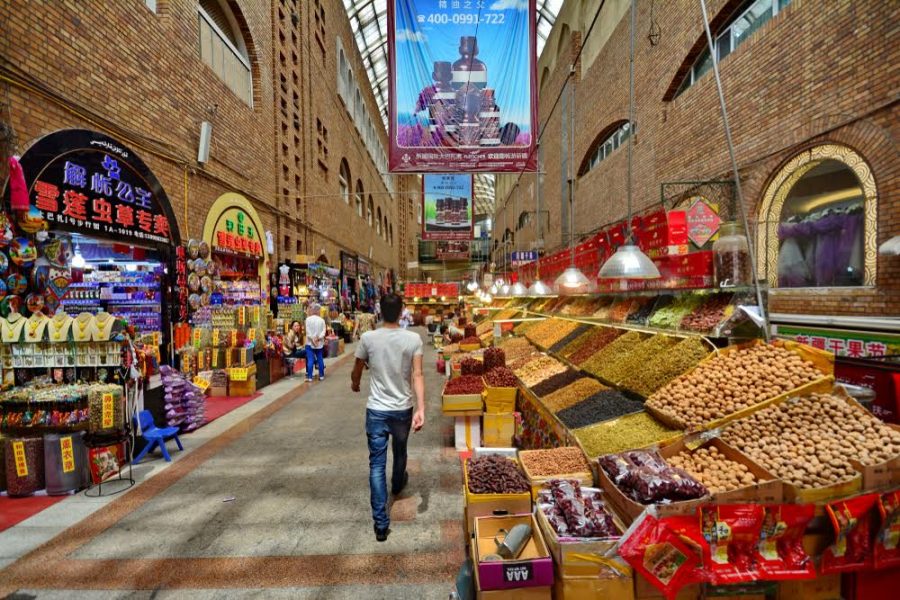The International Corner: The Persecution Of Muslims In China
Xinjiang – June 1,2017 : Urumqi International Grand Bazaar, Xinjiang China. A tourist must-see in the heart of Urumqi, the capital city of Xinjiang. – Image
Published: March 25, 2018
In the North Western corner of China rests the Xinjiang Autonomous Region. Xinjiang has the largest amount of Muslims than any other Chinese province. The ethnic people of Xinjiang are called the Uighurs, and they are a slowly but steadily vanishing people.
9/11 was a devastating tragedy. It changed and affected a great amount of the World’s Nations viewpoints on the Muslim world. For many Eastern countries like Russia and China, it was a scapegoat to take actions against its Islamic minority groups. Russia Invaded its own Islamic autonomous region, Chechnya, while China increased security measures and military presence in Xinjiang.
They claimed the reasoning for the lessening of rights was a preventive measure against terrorism and extremism, but does banning the public practice of a religion make sense? The Chinese authority in Xinjiang have set up re-education camps within Xinjiang and parts of Western China. These camps have the goal of eradicating the influence of Islam on the youths and populace. A detained Uyghur named Abdusalam Muhemet spoke to the New York Times and said that he was detained by police for reciting the Quran at a funeral. “That was not a place for getting rid of extremism,” he recalled. “That was a place that will breed vengeful feelings and erase Uyghur identity.” The camps teach Muslim Uighurs to speak Chinese and more closely follow the ideals of Chinese Marxism. The lengths of re-education can last from months to years.
In addition to camps, Muslims in Xinjiang are forced to break Islamic traditions or face punishment from officials. A local spoke to the Guardian about the treatment they face as ethnic Uighurs: “They are suspicious about everything: ‘Do you smoke? Do you drink?’ If you don’t, they’ll ask you why not. They’ll ask you if you pray. They’ll ask you if you want to go abroad, or if you’ve previously applied for or had a passport. If you look at the policeman, he’ll ask you what you’re looking at him for; if you look down at the floor, he’ll ask you why you’re looking down at the floor. Whenever we take a train, there’s always a separate room that we have to go through before we’re allowed to leave the station, where they check our documents and question us.”
We owe the news about the treatment of Uyghur Muslims to the work of investigative journalists in the region, who have also been imprisoned and expelled from China for dissident reporting on the topic of Xinjiang. For example, a correspondent from Buzzfeed was denied a renewal of her Chinese visa after reporting about Xinjiang.
The Muslim world has been strangely quiet on the persecution of Muslims in Xinjiang. If it was elsewhere, for example, Israel, there would be an global outrage. A reason for the lack of condemnation from Muslim majority countries may be Chinese investment. Chinese firms have invested billions into infrastructure projects in the third and second world, which includes many Muslim countries in Africa and the Middle East. A negative comment towards China might endanger the future flow of money from to these countries.
The U.N. on the other hand has vocalized a great amount of interest into the camps in Northwestern China. The U.N. Committee on the Elimination of Racial Discrimination estimated there was at least one million ethnic Uighur Muslims in detention in the camps. The Chinese Foreign Ministry has vehemently denied the claims of the operation of the reeducation camps, despite testimony of camp survivors and results of the U.N. inquiry. The Chinese have cited an increase in terrorism as reasons for increased security measures, but there have only been minor events involving Muslim extremism. Sooner or later the gig will be up for the Chinese Communist Party’s illegal operations in Xinjiang, as more interest builds in the West it will be harder to deny the existence of the camps.
The United States already has a large amount of tariffs on China. This current administration has been very hard on Chinese human rights breaches. The best thing that Donald Trump could do in this situation would be to increase tariffs on the Chinese government. Eventually the operation of the re-education facilities and camps in Xinjiang camps will become too costly to keep around due to the political strain from the U.S. At this moment China cannot risk even more loss of American trade, so they will most likely comply with the White House’s demands.








![2025 Snowcoming Pep Assembly [Photo Gallery]](https://FHNtoday.com/wp-content/uploads/2025/03/IMG_9969-300x200.jpg)
![2025 Snowcoming Dance [Photo Gallery]](https://FHNtoday.com/wp-content/uploads/2025/03/Snowco2025-Hmartin-3-300x200.jpg)
![Girls Soccer Holds Fourth Day Of Tryouts [Photo Gallery]](https://FHNtoday.com/wp-content/uploads/2025/03/AOrozco_Soccertryouts_3.6-20-300x200.jpg)

![Baseball Holds Their Last Day of Tryouts [Photo Gallery]](https://FHNtoday.com/wp-content/uploads/2025/03/baseball-tryouts-3.7-austin-griffin-11-300x200.jpg)


